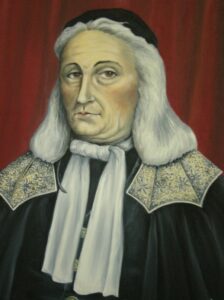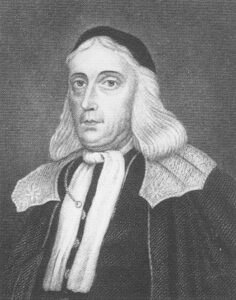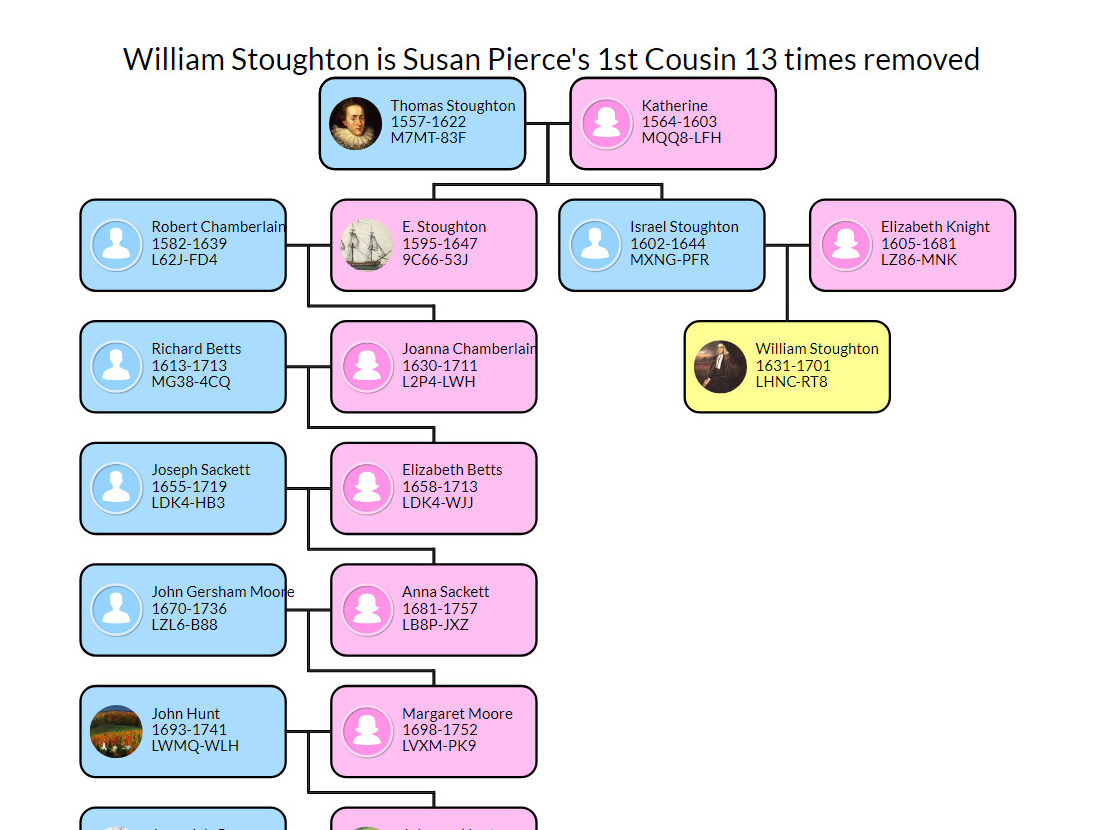
WILLIAM STOUGHTON
Ok, let’s talk about this William Stoughton dude. He is probably the tightest relationship among those of the Salem Witch trials, coming in as a first cousin 13 times removed. You can’t pick your relatives …right? My relationship to him comes down through the Green line. Though distinguished as a notable across history…I think the guy stinks through and through. Let me know your opinion.
William was born to the parents of Israel Stoughton and Elizabeth Knight Stoughton and was the grandson of Thomas and Katherine Stoughton (1557-1622) who would be our 12 th great grandparents through the GREEN line. The Stoughton’s were wealthy and large landowners but nothing compared to the land that William acquired. Though his date of birth is unknown he was probably born in 1631 and probably born in England somewhere. There are no records to prove that theory or even when exactly they migrated to the Massachusetts Bay Colony but by 1632 the Stoughton’s were in Dorchester, Massachusetts and among the early settlers.
EDUCATIONS BEGINS
William was a Harvard graduate with a degree in theology, and it was his intention to become a Puritan minister, so he traveled to England where he attended the New College Oxford to continue his studies. In 1653 he received an MA in theology.
He was a deeply religious man though in my opinion, he needed some lessons in tolerance, and preached “The Lord’s Promises and expectations of great things”. He preached in Sussex until Charles II was restored to the throne in 1660 and the crackdown on religious dissenters began which caused him to lose his position. The realization that he would not likely get another position in England, he decided to go back to Massachusetts in 1662.

Painted by Phylis Batchelder of Stoughton, Mass.
THE POLITICIAN
He refused offers of other ministerial positions and went into politics and land development, however, he did preach in Dorchester and Cambridge on occasion. . (that should have been the first clue!!! ) He served on the colony’s council of assistants almost every year from 1671 to 1684. He was among those who were labeled an enemy of the colony for his moderate position on colonial charter issues. When his friend and business partner, Joseph Dudley, wasn’t reelected to the council, and Stoughton, who was reelected by a small majority, he thought he’d “show them” by refusing to serve. (Sorry, but I already don’t like this guy! )
He and this Peter Bulkley became agents representing the colonial interest in England. For 1,200 lbs they acquired land claims from the heirs of Sir Ferdinando Gorges and John Mason. This conflicted with some Massachusetts land claims in Maine. OHHH this pissed off Charles II because he wanted those claims for the Duke of York. They weren’t able to get broader claims made by Massachusetts against other territories of Maine and the province of New Hampshire due to their limited authority and this upset the Lords of Trade because they wanted to have the colonial laws modified to their policies. All this did for Stoughton and Bulkley is piss off the colonial officials in London because they wouldn’t give in.
Now, Stoughton and Dudley worked closely together politically and in land development, and they were business partners as well. In partnership with Dudley in the 1680s, Stoughton acquired significant amounts of land from the Nipmuc tribe in today’s Worcester county. This partnership included a venture that established Oxford as a place to settle refugee Huguenots.
Now, I don’t understand politics much, and I won’t begin to tell you that I understand land claims or the like…but it sounds to me like these two dudes were just shady and ruthless. I could be reading more into it than what is because I’ve already made up my mind that I don’t like these guys!
So Dudley and Stoughton basically used their political positions to make sure that the titles to lands they were interested in were judicially cleared which benefitted themselves, their friends, relatives, and other business partners. Crown agent Edward Randolph wrote that it was impossible to bring titles of land to trial before them where his Majesty’s rights were concerned, the Judges also being parties.
Stoughton and Dudley ventured to obtain a million acres of land in the Merrimack River valley. Dudley’s council, which included Stoughton and other investors, cleared the land’s title in May of 1686.
When Dudley was commissioned in 1686 to be the temporary head of the Dominion of New England, guess who he appointed to his council?? Of course, Stoughton, and then he was elected by council to be the deputy president. During the administration of Sir Edmund Andros he served as magistrate on the council. As a magistrate he was especially hard on the town leader of Ipswich who had organized a tax protest against the dominion government, based on a claim that dominion rule without representation violated the right of the Englishmen.
In 1689 when Andros was arrested in an uprising inspired by the 1688 Glorious Revolution in England, guess who was one of the signatories to the declaration of the revolt’s ringleaders? Yep you guessed it. Stoughton. His association with Andros made him particularly unpopular and he was denied elective offices. He, of course, appealed to the political power of the Mather family with whom he still had a positive relationship.
Increase (what a name) Mather and Sir William Phips arrived from England in 1692 carrying the charter for the new Province of Massachusetts Bay and a royal commission for Phips as governor, they also brought one for Stoughton as lieutenant governor.
 WITHCRAFT ACCUSATIONS BEGIN
WITHCRAFT ACCUSATIONS BEGIN
By now the rumors of witchcraft were starting to spread like wildfire…especially in Salem.. so Phips appoints Stoughton to be head of a tribunal to deal with those accused of witchcraft, and in June he was appointed chief justice of the colonial courts. He held this post for the rest of his life.
Stoughton was both the chief judge and prosecutor. The terminator so to speak. I mean, this guy was ruthless. In the case of Rebecca Nurse…he sent the jury back from deliberating to reconsider the not guilty verdict they had agreed on. Well, what’s the jury to do…they came back with a guilty verdict and poor Rebecca Nurse was convicted.
Stoughton permitted the use of spectral evidence. That is the idea that a demonic vision could only take the shape or appearance of someone who had made a pact with the devil or was engaged in witchcraft. Oh Lordy! That left the door wide open! Cotton Mather argued that this was acceptable when making accusations but some judges did not feel it was acceptable in judicial proceedings. Stoughton was convinced of its acceptability and used his influence on the other judges to see it his way. Now, understand this guy was a Puritan Preacher, and for the times he probably wasn’t really so out of line, but I’m having a hard time not judging him.
Phipps oversaw a reorganization of the colony’s courts in November and December of 1692, to bring them into conformance with English practice. Stoughton was still sitting as chief justice and was to handle the witchcraft cases in 1693 but was given strict orders to disregard spectral evidence. With this thrown out, there were a significant number of cases that were dismissed due to lack of evidence. It makes me wonder what these accusations did to the accused reputations. Were people sued for slander in those days? I’ll have to look that one up.
On January 3 1693 Stoughton ordered the execution of all suspected witches who had been exempted by pregnancy. Phips denied enforcement of the order. This totally pissed Stoughton off and he, once again, thought he would “show them” by leaving the bench for a brief time.
Unlike many others, Stoughton never felt remorse or guilt for the part he played in the convictions of “witches” or the use of spectral evidence during the trials.
Stoughton viewed himself as a caretaker, holding the government together until the crown appointed a new governor. As a consequence, he gave the provincial assembly a significant degree of autonomy, which, once established, complicated the relationship the assembly had with later governors. He also took relatively few active steps to implement colonial policies, and only did the minimum needed to follow instructions from London. A commentator in the colonial office observed that he was a “good scholar”, but that he was “not suited to enforce the Navigation Act”
Sounds to me like he was a my way or the highway sort of guy. It’s no wonder he died a bachelor.
William Stoughton died at home in Dorchester in 1701, while serving as acting governor, and was buried in the cemetery now known as the North Burying Ground. He was a bachelor, and willed a portion of his estate and his mansion to William Tailer, the son of his sister Rebeccah. Tailer, who was twice lieutenant governor and briefly served as acting governor. He was buried alongside Stoughton.
Stoughton, Massachusetts is named in honor of William, as is one of the Harvard College dormitories at Harvard Yard. Stoughton Hall was made possible by his gift of 1,000 pounds in 1698.
Here you can see pictures of his grave. It’s as creepy as he is. https://www.oddthingsiveseen.com/2015/09/villains-end-grave-of-william-stoughton.html
It suits him as the above the ground tomb is engraved with skulls and overgrown with vines.
Here is a break down of the life of William Stoughton.
September 30, 1631: Born in England (or perhaps in Massachusetts), son of Israel and Elizabeth (Knight) Stoughton.
1650: Graduated Harvard University with a degree in theology.
June, 1653: Graduated New College in Oxford, England graduating with a M.A. in Theology.
1660: Served as a curate in Sussex, England.
1662: Returned to Massachusetts after the restoration of King Charles II of England to the throne after losing is position as a curate.
1662: Served as a clergyman in Dorchester, Massachusetts
April 29, 1668: Gave the election sermon (New-Englands True Interest; Not to Lie…, 1670)
1670: New-Englands True Interest; Not to Lie … is published
1671-1674: Selectmen in Dorchester
1676: Sent to England with Peter Bulkeley.
1684-1686: Served as Deputy President of the Colonies temporary
1686: Appointed Deputy to Gov. Joseph Dudley
March 3, 1687: Appointed Judge Assistant by Gov. Joseph Dudley.
1690‘s : A chief Magistrate and the first Chief Justice of the Massachusetts Supreme Court.
May 14, 1692: Appointed Lieutenant Governor of Massachusetts.
May 27, 1692: Gov. William Phipps issued a commission for a Court of Oyer and Terminer which appoints as judges Lt. Gov. William Stoughton and others, including: John Hawthorne, Nathaniel Saltonstall, Bartholomew Gedney, Peter Sergeant, and Samuel Sewall.
December 22, 1692: Appointed as the first Chief Justice of the Massachusetts Supreme Court.
1694-1699, 1700-1791: Served as acting Governor.
1698-1699: Stoughton Hall built on the grounds of Harvard University.
July 7, 1701: Died at his home at the northeast corner of Pleasant Street and Savin Hill.
1726: The South Precinct of Dorchester in named in his honored after Stoughton.
1781: Original Stoughton Hall torn down.
1805: The present Stoughton Hall at Harvard University is built on a different site.
1828: His tomb is repaired by efforts from Harvard University.
1855: Stoughton School erected in Dorchester, Massachusetts.
Online Sources:
- Wikipedia entry on William Stoughton
- Official Biography from the Commonwealth of Massachusetts
- Salem Witchcraft Trials – Biography on William Stoughton
- Biography on University of Missouri-Kansas School of Law
- Biography on www.FindaGrave.com
- Biography on www.Bookrags.com
- The Stoughton Cup presented to Harvard University by William Stoughton in 1701


So what do you think of this guy? What’s your opinion? Am I making too much out of it? I mean there is a lot written about him but his involvement with the Witch Trials is probably what he is most remembered for. Would anyone remember him if it hadn’t been for the part he played in the hysteria? Let me know your thoughts in the comments and stay tuned as we explore the roles of some others!
Happy Hunting!!
The Pierce Family Historian!
